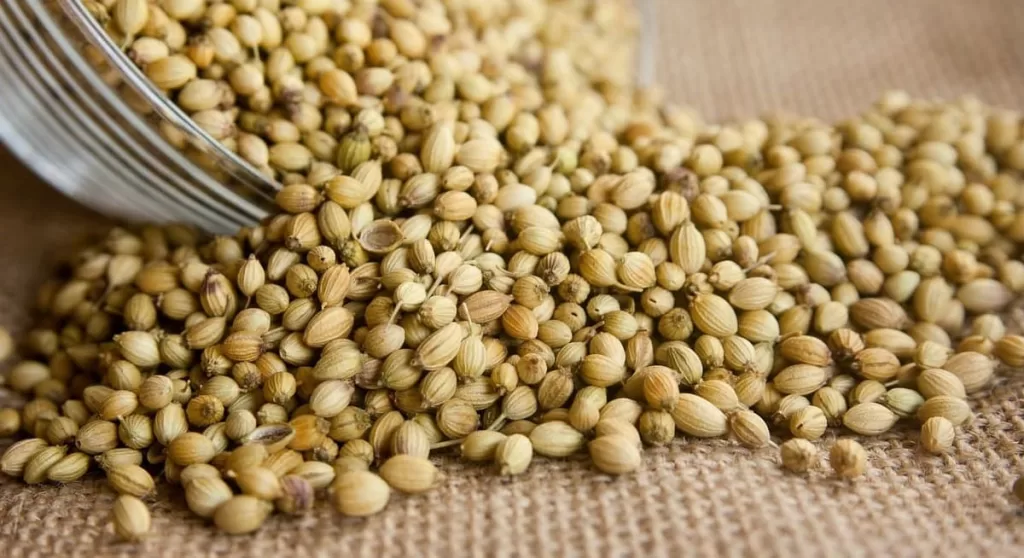Coriander seeds health benefits
Coriander seeds, also known as dhania, are widely used as a spice in Indian, Middle Eastern, and Mediterranean cuisine. Apart from their culinary uses, coriander seeds are also known for their medicinal properties. Here are some of the potential health benefits of coriander seeds:
- Digestive aid: Coriander seeds are known to aid digestion by stimulating the production of digestive enzymes. They also help to alleviate digestive problems such as bloating, gas, and constipation.
- Anti-inflammatory: Coriander seeds contain anti-inflammatory compounds that may help to reduce inflammation in the body. This property makes them beneficial for those suffering from conditions like arthritis, asthma, and other inflammatory disorders.
- Antioxidant: Coriander seeds are rich in antioxidants, which help to protect the body against free radical damage. Free radicals are unstable molecules that can damage cells and contribute to developing chronic diseases like cancer and heart disease.
- Cholesterol-lowering: Coriander seeds may help to lower cholesterol levels by reducing the amount of LDL (bad) cholesterol in the blood. This may help to reduce the risk of heart disease.
- Blood sugar control: Coriander seeds have been shown to have a hypoglycemic effect, which means that they can help to lower blood sugar levels. This property makes them beneficial for those with diabetes or those at risk of developing the condition.
- Anti-microbial: Coriander seeds contain compounds that have anti-microbial properties, which means they can help to fight off harmful bacteria and fungi. This property makes them useful in the treatment of infections.
- Anxiety reduction: Coriander seeds have been used traditionally to help reduce anxiety and promote relaxation. They contain compounds that may help to calm the nervous system and reduce stress.
Overall, coriander seeds have a variety of potential health benefits and can be a helpful addition to a healthy diet. However, it is essential to note that more research is needed to fully understand the extent of these benefits and the appropriate dosages. As with any herbal supplement, it is best to consult with a healthcare professional before incorporating coriander seeds into your diet.
How to consume according to Ayurveda
According to Ayurveda, coriander seeds can be consumed in various ways to derive their health benefits. Here are some common ways to consume coriander seeds as per Ayurvedic practices:
- Coriander seed water: Soak a teaspoon of coriander seeds in a glass of water overnight. In the morning, strain the water and drink it on an empty stomach. This is believed to help with digestion, reduce inflammation, and promote healthy skin.
- Coriander tea: Boil a teaspoon of coriander seeds in a cup of water for 5-10 minutes. Strain and add honey or lemon as desired. This tea is believed to be a good remedy for indigestion, bloating, and nausea.
- Spice mix: Coriander seeds can be roasted and ground into a fine powder, which can then be added to various spice mixes used in cooking. This is believed to enhance the flavor of the food and aid digestion.
- Coriander seed powder: Coriander seed powder can be added to soups, stews, and other savory dishes to enhance their flavor and health benefits.
- Coriander seed oil: Coriander seed oil is believed to have anti-inflammatory and analgesic properties. It can be used for massages to relieve joint pain and muscle soreness.
It is important to note that while coriander seeds are generally safe, some people may be allergic to them. It is best to start with small amounts and gradually increase the dosage to avoid any adverse reactions. Additionally, pregnant women should avoid consuming coriander seeds in large quantities as it may stimulate contractions. It is always advisable to consult with a qualified Ayurvedic practitioner before incorporating any new food or herb into your diet.






